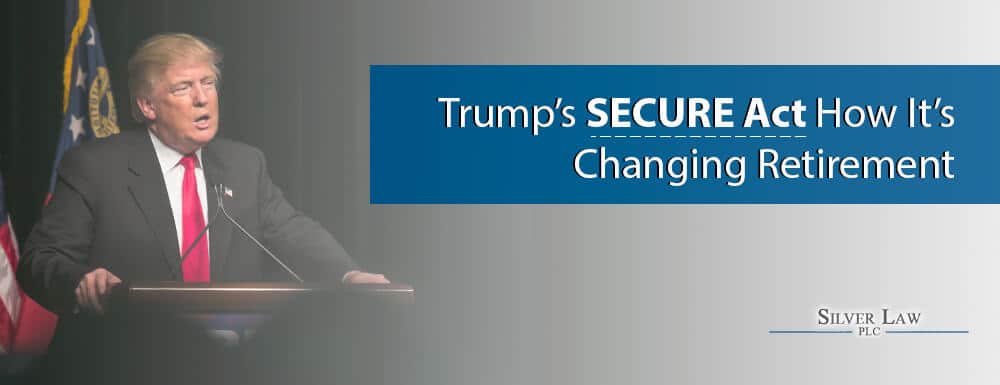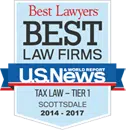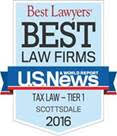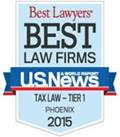Provisions of Taxpayer First Act Go into Effect Earlier this summer, President Trump signed into…
Trump’s SECURE Act: How It’s Changing Retirement
Just ahead of the holidays, President Trump signed the SECURE Act into law as part of an overall spending bill. The Act, which is an acronym for Setting Every Community Up for Retirement Enhancement, makes several changes to current retirement regulations. The new legislation is intended to improve retirement security.
Multiple changes will be made with the new legislation. It’s important that you talk through these with a financial advisor and a tax professional in Nevada. Here’s a closer look at what’s going to be different:

Annuities as Investment Options
Previously, employers could offer annuities as an investment option for their 401(k) plans, but they would bear the responsibility of ensuring that the annuities were appropriate investment choices. Under the SECURE Act, employees don’t bear that responsibility – the insurance companies that sell the annuities are responsible.
Annuities provide a guaranteed income over the course of the person’s lifetime – even if they live much longer than expected. Allowing employers more flexibility to offer annuities means that more people will have the option to take advantage of them.
Minimum Distribution and Maximum Contribution Ages
The previous law required that those with an Individual Retirement Account (IRA) or a 401(k) to begin making withdrawals from these accounts the same year that they were 70.5 years old. However, people are living and working far longer, and not everyone is ready to begin making withdrawals then. The SECURE Act increases that age to 72. Though it isn’t much more time, it does provide a little buffer for those who aren’t quite ready to retire.
The maximum age to contribute to an IRA was previous capped at 70.5 years old, and the new act eliminates that age cap.
Stretch IRAs
Typically, a person inherits retirement benefits from their husband or wife after they die. However, some people inherit these benefits from other relatives or loved ones. The law previously allowed some of these people to make withdrawals on these accounts for the remainder of their lives.
Under the new law, such beneficiaries will be required to make all withdrawals within 10 years. The entire balance must be distributed within that time.
Multiple Employer Plans
Small businesses have traditionally had to share a common characteristic with other businesses banding together to offer a retirement plan. But this set up a problem whereby some companies would suffer if just one in the group didn’t meet the plan requirements – the “one bad apple” rule.
Now, small businesses can join with others regardless of those shared characteristics, giving them access to more retirement plan options for their employees.
Part-Time Worker Benefits
Part-time workers traditionally haven’t been offered retirement benefits. The previous law allowed long-term part-time workers to get benefits if they worked at least 1,000 hours every year. The new law lowers that threshold, allowing more people to take advantage of retirement benefits. Under the SECURE Act, workers who have 1,000 hour for the year or who have 500 hours or more for three consecutive years can be invited to participate in employer-sponsored retirement benefits.
Auto-Enrollment
Employees are typically given the option to participate in the company’s retirement plan. But some company’s encourage participation by automatically enrolling their employees and then giving them the option to opt out. Studies have shown most people are more likely to stay in a plan in which they are automatically enrolled than they are to enroll in a plan voluntarily.
Under the new Act, employers are encouraged to automatically enroll their employees in a retirement plan. The Act includes a tax credit to offset the cost of starting a 401(k) or IRA plan that includes auto-enrollment. This credit will be in addition to the other start-up credit already offered.
Though the changes made under the SECURE Act are designed to increase retirement security, they can also change your tax bracket and tax obligations without you realizing it. While you should talk to a financial planner to take advantage of all the SECURE Act makes possible for your retirement, you should also talk to a tax lawyer in Nevada to ensure that you are still meeting your tax obligations. Business owners should also talk to a tax professional to get maximum tax benefits.
Silver Law PLC can help you navigate the changes under the SECURE Act and can represent you if you end up in tax trouble because of missteps taken without realizing how the Act’s changes affect you. We represent business and individual clients in civil and criminal tax litigation, tax audits, issues of foreign tax reporting, and more. Contact us today in Nevada to talk with one of our tax lawyers about your needs or concerns.
Silver Law PLC
Nevada Location
410 South Rampart Blvd, Suite 390
Las Vegas, Nevada 89145
Office: 702-318-7130
Website: taxcontroversy.com
Arizona Location
7033 E. Greenway Pkwy, Ste 200
Scottsdale, AZ 85254
Office:(480) 429-3360
Website: taxcontroversy.com
















Leave a Reply
You must be logged in to post a comment.